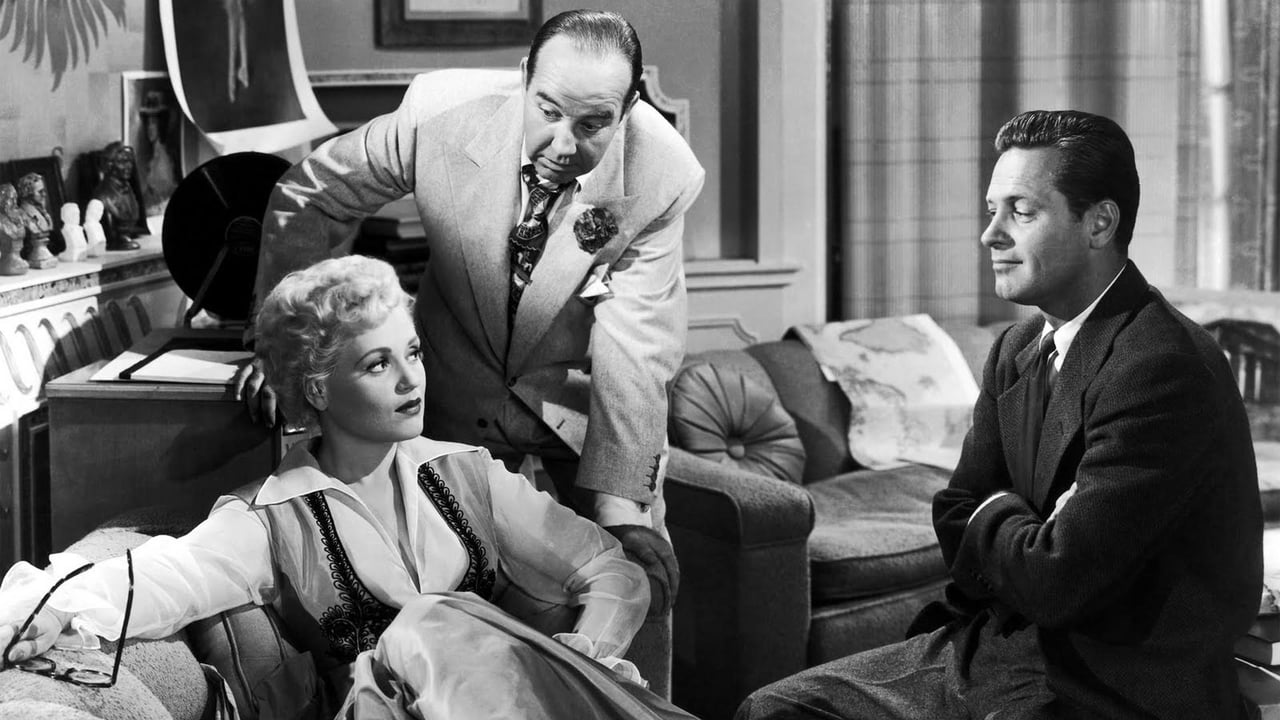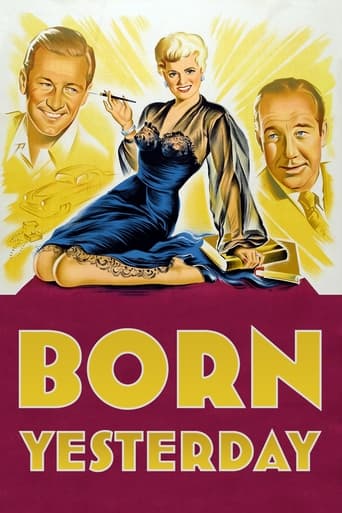

Sometimes I wish that millennials, gen-xers, etc. wouldn't bother watching classic films, at least the nay-sayers writing reviews. They don't get it. Their comments reveal no understanding of context. They self-absorbed seem to expect that films produced before they were born should have been made in anticipation of their 21st century sensibilities (or lack of them), their devotion to CGI, action, and their limited attention spans.I've been watching a lot of old films lately (most I've seen before having been raised by my parents to appreciate them) and I have been surprised by the kernels of relevancy they may contain; even a not very good Dr. Kildare film has Dr. Gillespie espousing that comprehensive health care should be a right for all.Watching Born Yesterday again after many years, I see the themes of greed - for wealth, for power, corruption in government, domestic violence, women empowering themselves.Watching Broderick Crawford's bullying business tycoon Harry Brock, I see Donald Trump.That's a timely film.
... View MoreIt's a long time since I reviewed Born Yesterday. This time through, I thoroughly enjoyed it. It's not just a message movie! It's actually thoroughly entertaining from go to almost last. I would have preferred a less obvious conclusion and a little less righteousness, but I seem to be in a minority of one. But I agree with everyone else about Judy Holiday. I thought Judy was absolutely wonderful. Bill Holden and Brod Crawford were also ideally cast, and even Howard St. John (pronounced "Sinjin") likewise delivered his lines with just the right touch. But it's Holiday's movie. Notwithstanding the fact that she played the role on Broadway no less than 1,642 times, she gives a fresh, vigorous and – dare I say it – enchanting performance! She is brilliant and thoroughly deserved all her multiple awards for Best Actress. This movie is available on an excellent Columbia DVD.
... View MoreBack in 1950 Born Yesterday was a staggeringly huge box-office success. This Rom-Com really wowed its audiences with its apparent clever wit that had them all literally rolling in the aisles with peals of uncontrollable laughter.But, today, 63 years later - I found this film's somewhat contrived and predictable story to be repeatedly teetering on the very edge of being just a one-note joke that got mighty stale after just the first half-hour.At the start Judy Holliday's Billie Dawn character (in all of its crudeness and its cluelessness) was kind of cute and amusing - But, it certainly didn't take long for the loud-mouthed brassiness of her character to grate on my nerves like you wouldn't believe.It certainly seemed to me that the more Billie got educated (which seemed to happen at about warp speed) the more annoying and downright tiresome she became. And I also found that she proved, in the end, to be way too smart to have actually been as unbelievably dumb as she was initially perceived to be.I personally thought that Holliday was badly miscast as the Billie character. Not only did she lack any conviction in her overall performance, but, she was painfully deficient of any sexual appeal, as well.I think that this was the sort of role meant for an actress with the dynamic screen-presence of Marilyn Monroe, which Holliday obviously lacked.Besides Holliday not being able to cut the mustard in this comedy, I also thought that Broderick Crawford was a repulsive bore as the big-mouthed bully-of-a-billionaire and William Holden as the true-blue, little news-reporter was far too wishy-washy for my liking.All-in-all - Born Yesterday was just a so-so comedy that really baffles me in regards to it huge popularity back in its heyday.
... View MoreI expect the movie's serious side took a backseat to Holliday's overpowering comedic performance. Her Billy Dawn is certainly Oscar-worthy in that year's heavy competition. Who can forget the Minnie Mouse voice, the big saucer eyes and sweetly naïve manner. Together, they combine into a career performance in what's a slyly demanding role. But especially, I love that gin game with the exasperated Harry. Billy seems so scatter-brained and he so focused, it's almost like seeing Al Capone get bested by Daffy Duck. What an expert piece of comedic architecture— in my book, it's the movie's and Crawford's best moments.Speaking of Crawford, he's so consistently loud and abusive, his Harry the junk man (how appropriate) amounts to almost a cartoon character in itself. Director Cukor was known as a woman's director, so maybe that's why Crawford goes over the top. But whatever the reason, he's much too much. The overbearing Harry is supposed to be dislikable but not so dislikable that he becomes a caricature. On a slightly different plane, note how the sexual conventions of the time are slyly finessed—the sleeping arrangements, Billy's withholding sex after the gin game, the suspicious hundred dollars her dad refuses, etc. These amount to a more suggestive screenplay than usual for that straitjacketed time. As funny as the movie is, it still adds up to more than just an expert amusement. There's a substantial subtext worth remarking on. For example, the moral of the screenplay is a clear one—no tyranny over people's minds. That lesson, of course, applies to Billy in spades, though she acts it out in highly amusing fashion. As the domineering Harry's silken mistress, she shows a tyrannized, inhibited silence in the film's first part— which is also why she so cleverly annoys Harry during that delicious card game. The ex-show girl may be a well-kept victim (check out her suitcases in the hotel lobby), but she's a victim no less, not only of Harry's abuse, but of her own difficult background, as well. The trouble is she's also a victim of her own assumptions and expectations about herself.Thus, when writer- educator Paul (Holden) arrives on the scene, he arrives as a potential liberator, bringing her both respect and ideas. But he's got to free her not only from Harry, but from her past dependent self, as well. Those tutoring scenes in the nation's capital with its inscribed democratic ideals are well chosen. The ideals, as we learn, apply not only to nations, but to individuals, as well. So when Billy finally recognizes how the two converge, she opens up a new independence of mind and personhood she never realized were waiting there to be freed. And when she finally leaves Harry for Paul, with just a few clothes, she's in effect chosen the 'happy peasant' over the powerful man (Napoleon) and the movie's moral parable is complete. Nonetheless, there are limits to these lessons. For example, the national monument scenes need not be so reverential since democracy itself remains an ideal, not a religion to be worshipped; at the same time, the 'founding fathers', for all their gifts, were only mortal men and not the gods of a religion. Moreover, the happy peasants of the script don't usually take the risks that drive a history of social and economic progress. Harry may not exemplify this worthy type of risk-taking, but there are limits, I believe, to the 'happy peasant' as a paradigm for an entire society. Of course, the comedic side of the movie means these more serious points can't be made too subtle or controversial, otherwise the funny parts would be undermined. But I can't help wondering just for the fun of it about the casting. Suppose that instead of the handsome Holden as Billy's catalyst, an ordinary looking man were there instead. Then I wonder how Billy would respond. Or instead of the bullying Crawford, suppose someone less good at being obnoxious were cast. But, of course, much of the movie's satisfaction comes from seeing this nasty guy and his plush prison get rejected.None of this is meant to take away from the superb comedic side of the movie. But the exceptional appeal of the material (Kanin and Mannheimer) is that it so neatly combines the laughs into food for thought and both of them into a single entertaining package. But above all, the movie remains a superb showcase for one of the best comediennes of that day or this. What a loss that she died so young. Fortunately, the laughs remain.
... View More